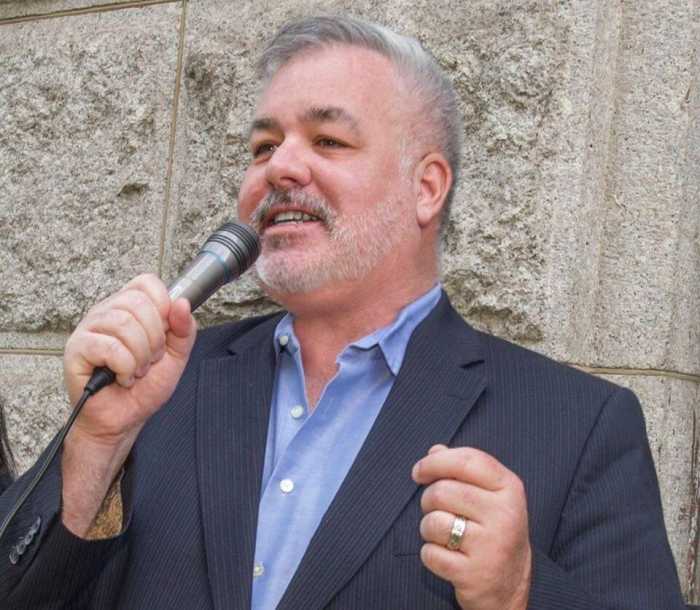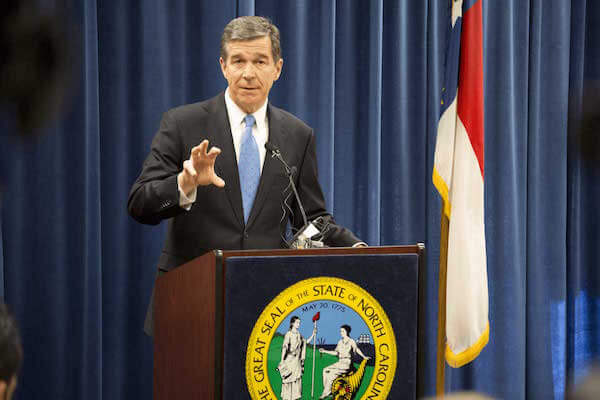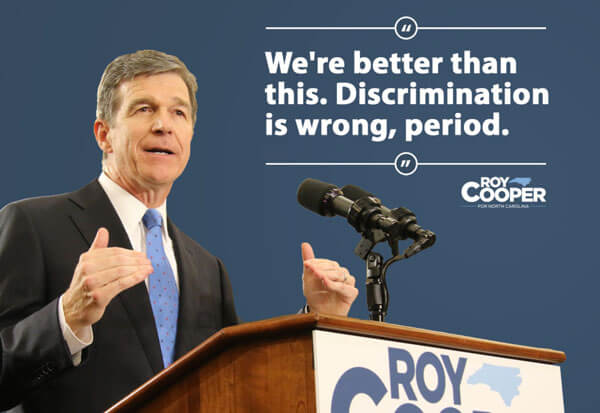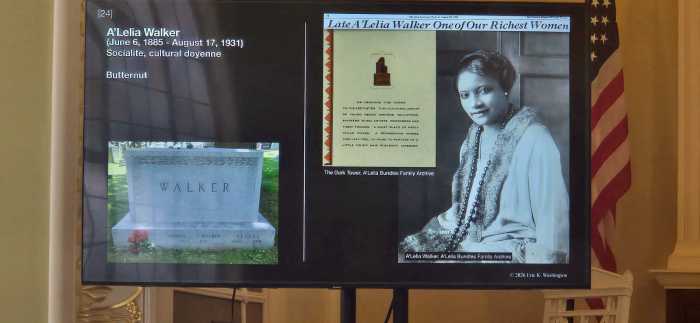In 2014, after federal courts ruled that North Carolina had to allow same-sex couples to marry, Lonnie Billard and his long-time partner Richard Donham decided to marry. Billard posted an exuberant announcement on his Facebook page for his friends only, and he ended that announcement by stating, “If you don’t agree with this. . . keep it to yourself. You never asked my opinion about your personal life and I am not asking yours.”
Among Billard’s Facebook friends were staff and parents associated with Charlotte Catholic High School, where he had taught as a substitute English teacher since 2012, after a decade as a full-time member of the faculty teaching English and Drama. His friends did not keep the news to themselves, and the school stopped calling Billard as a substitute. When he asked why, he was told by the assistant principal that it was because he “announced his intention to marry a person of the same sex.”
Billard had been a very successful teacher at Charlotte Catholic. He won the Inspirational Educator Award from North Carolina State University in 2011 and the Charlotte Catholic Teacher of the Year Award in 2012. He had been nominated for that award “every year since its inception,” according to the man who was principal of the school at that time. He had been associated with the school since 2000, and throughout that time he had been in a “romantic relationship” with Donham, whom he listed on Charlotte Catholic employee contact forms as his “friend” or “housemate,” and who was identified on some forms as living at the same address as Billard. Donham came to Charlotte Catholic events with Billard, accompanying him on class trips to New York City with the drama students to see musicals, and had even served as a substitute teacher when Billard was teaching English full-time. Donham also substituted at the Charlotte Diocese’s middle school. Billard claimed that members of the high school’s administration knew that he was gay, but the current principal and assistant principal both claimed, rather incredibly, that they were not aware of his sexual orientation until his Facebook post in December 2014.
The Catholic Church is outspokenly opposed to same-sex marriage, and Catholic schools, which have employed many lesbians and gay men as teachers, have consistently dismissed those employees, regardless of how they have performed their jobs, upon finding out that they intended to or had married same-sex partners. The de facto position of the Church sounds like the federal government’s old “don’t ask, don’t tell” policy on gay military service. They were happy to employ qualified gay people as ministers (especially church musicians) and teachers, so long as the employees were quiet about being gay and did not go public on same-sex marriages, which the Church saw as defying Catholic doctrine and setting a bad example for congregants and students.
Billard filed a charge with the Equal Employment Opportunity Commission (EEOC) in May 2015, claiming a violation of his rights under Title VII, but at that time the EEOC had not yet issued its ruling that it would investigate and prosecute sexual orientation claims under Title VII’s ban on discrimination because of sex. Ironically, the EEOC issued such a decision, in the case of gay air traffic controller David Baldwin, in July 2015, shortly after the Supreme Court ruled in June 2015 in the Obergefell case that same-sex couples had a constitutional right to marry. Billard’s charge was still pending with the EEOC at that time, but perhaps the school’s religious defenses discouraged the EEOC from pursuing Billard’s case directly, as it decided not to sue Charlotte Catholic High School on his behalf, instead issuing a “Notice of Right to Sue Letter” to him in November 2016. He obtained representation from the ACLU Foundation and its North Carolina affiliate, which filed suit against the school in January 2017.
On September 3, US District Judge Max O. Cogburn, Jr., of the federal district court in Charlotte, granted summary judgment to Billard and denied summary judgment to the school, finding that Billard had proven a clear violation of Title VII and that none of the defenses argued by the school were valid.
The school argued that it had not fired Billard because is gay, but rather because he supports gay marriage, which the Catholic Church opposes. The school argued that under the First Amendment’s protection for free exercise of religion, it is privileged to discharge teachers who disagree with the Church’s positions. The school also argued that it was protected from liability by two sections of Title XII that relieve religious institutions, including religious schools, from complying with the statute’s ban on discrimination because of religion. The school further cited a “church autonomy doctrine” under the First Amendment, which prohibits “excessive government intrusion upon religion” and which includes the so-called “ministerial exception” that the Supreme Court has identified as sheltering religious institutions from any liability for their employment decisions regarding ministers. The school also cited the Religious Freedom Restoration Act, arguing that this federal statute would prevent the court from holding it liable for discrimination under Title VII.
The school actually disclaimed any contention that Billard comes within the ministerial exception, but to be on the safe side, Judge Cogburn explained why Billard’s duties as a substitute teacher did not come within the scope of that exception, as most recently described by the Supreme Court last year in a Catholic schoolteacher case, Our Lady of Guadalupe School v. Morrissey-Berru. Despite the Supreme Court’s broad definition of the exception to extend to any religious school teacher who performed any religious functions, the judge concluded that Billard’s charge to lead a prayer at the beginning of each class was too minimal to excuse the School from complying with Title VII in his case. He was not hired to teach religion.
Judge Cogburn rejected the school’s argument that discharging somebody for announcing his plans to marry a same sex partner was not discriminating against him because of his sex (or sexual orientation), drawing a comparison to Supreme Court Justice Neil Gorsuch’s reasoning in the Bostock decision of 2020. The judge pointed out that a female teacher who posted an announcement on Facebook that she was marrying a man would not be discharged, but when Billard, a man, posted the announcement that he was marrying a man, he was discharged, so clearly his sex was a reason for his discharge. Justice Gorsuch had described similar hypothetical situations in explaining the Supreme Court’s conclusion that firing an employee for being gay was inescapably due, in part, to the employee’s sex, and thus prohibited by Title VII, even though members of Congress in 1964 would not have expected such a ruling. Gorsuch, a “textualist,” takes the view that the words of the statute take priority over the expectation or intentions of the legislators who passed it, and his view won the support of six of the Court’s nine members.
As to the express religious institution exemptions included in Title VII, the court concluded that they were not intended to excuse religions institutions from complying with Title VII’s ban on discrimination because of sex. Rather, they were enacted to allow religious institutions to prefer members of their faith in making employment decisions. Billard is a Catholic, and the court was unwilling to accept the school’s argument that a provision allowing it to discriminate because of religion also gave it a right to discriminate because of sex if it had a religious reason for doing so. Under that theory, a religious institution would be free to discriminate on the basis of race, color, national origin or sex, the other categories prohibited under Title VII, which stretches the religious exception too far and would expose thousands of employees of religious institutions to discriminatory treatment. Congress has not given religious institutions free reign to discriminate against employees for reasons other than the employees’ religion.
As to the Religious Freedom Restoration Act, many federal appeals courts have ruled that it applies only to situations where the government is suing to enforce a federal statute against a religious defendant, but not to lawsuits brought by private individuals. Although the Supreme Court has yet to rule on this question, and at least one appeals court has disagreed with that conclusion, Judge Cogburn found based on a close reading of the text of RFRA that it was clearly aimed to restricting enforcement actions by the government, and that a court decision in a lawsuit brought by a non-governmental litigant, such as Lonnie Billard, would not be subject to RFRA’s requirement that the government prove it had a compelling interest to enforce a federal law that burdens the defendant’s free exercise of religion. The court itself is not a “party” to a non-governmental lawsuit, and in the absence of a governmental party, the affirmative defense provisions of RFRA have no application.
Several lawsuits are pending around the country in which employees of Catholic institutions who were discharged over the same-sex marriage issue are seeking relief under Title VII. In many of them, the plaintiffs’ job duties were such as to bring them within the ministerial exception. Billard’s is the rare case that was not, at least according to Judge Cogburn’s analysis.
Having granted Billard summary judgment on the merits of his claim, Judge Cogburn ordered that the case “Proceed to trial to determine the appropriate relief that should be granted.” It is likely that to avoid a court order to reinstate Billard as a substitute teacher, the school may offer a substantial financial settlement. Title VII specifically lists “reinstatement” as a remedy for a wrongful discharge. If the case doesn’t settle and Judge Cogburn orders reinstatement, the school and the Roman Catholic Diocese of Charlotte, a co-defendant, are likely to appeal to the Fourth Circuit Court of Appeals.
Judge Cogburn was appointed to the court by President Barack Obama. In 2014, he wrote the decision striking down North Carolina’s ban on same-sex marriage, a decision that was upheld by the Fourth Circuit and denied review by the Supreme Court, and it was the decision that led Billard and Donham to decide to get married that led to this lawsuit!



































